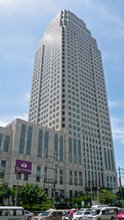
A property expert has urged the government to speed up work on new mass-transit routes as it would help the overall economy and the real estate sector.
Investment in the property business generally creates related economic activity that is about 2.5 times of the invested amount, according to Associate Prof Manop Bhongsadadt of Chulalongkorn University.
Mass transit would offer more convenient travel, a better environment, reduced fuel consumption reduction and thus an improved trade balance, helping the economy through government investment and distribution of income, he said yesterday.
''Within the next 15 years, Bangkok, which currently has a population around eight million, would increase to 15 million so mass transit with good city planning will help manage the population relocation to Greater Bangkok,'' he said at a seminar on the industry outlook.
Mr Manop suggested that the Bangkok Metropolitan Administration amend city planning regulations by increasing the density of residents allowed in real estate projects on condition that developers provide more open spaces.
As Bangkok continues to grow, the BMA envisions six new strategic economic locations farther out from the congested city centre, including Yannawa, once transport links improve.
Teerachon Manomaiphibul, the deputy managing director of the listed developer Property Perfect Plc, suggested the Mass Rapid Transit Authority raise funding for more routes by selling or leasing its land bank to generate capital for investment. The potential land bank includes more than 100 rai in Makkasan and Bang Sue.
He believes new transit routes will also lead to a new facet of competition among real estate developers as they will have to more carefully serve customers' changing lifestyles and offer high quality of life.
The impact of the existing BTS skytrain and MRT underground train is already clear n several areas, developers say. Land prices have more than doubled in areas along the three main routes: Sukhumvit, Phahon Yothin and Ratchadaphisek. Outer Sukhumvit prices have risen to from between 30,000 and 40,000 baht to more than 100,000 baht per square wah, similar to prices along Ratchadaphisek, which have risen from between 40,000 and 50,000 baht per square wah.
Mr Teerachon said there were 48 condominiums near mass transit with 22,786 units as of 2006. Many have had good sales with some sold out and some recording at least 80% sales.
However, he said the government's mass-transit plan still contained risks due to frequent policy changes, so developers lacked confidence in whether and where routes would be constructed, which affects investment planning and timing.
''Megaprojects have been drawn into politics,'' he said.
Mr Teerachon believes more mass transit will create satellite communities to help expand growth and reduce density in the capital's central area. These communities would help absorb demand from city condominiums to townhouses and single houses on the outskirts.
He said the public utilities that should be provided for every 5,000 residential units included a kindergarten, a high school, polyclinic, middle-size public park and sport stadium. Also essential are a feeder system to reach the mass-transit lines, supermarkets, commercial areas, police and fire stations, financial institution branches and areas for small business.
Source: Bangkok Post


1 comment:
A very very good article. Follow their advice and you can't go far wrong. Bangkok Condos
Post a Comment